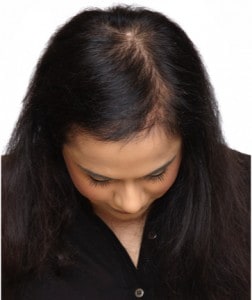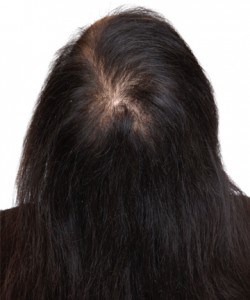Everyone is prone to stress, but the way that stress manifests itself can vary from person to person. For some, however, the mental anguish they experience affects not only their psychological wellbeing but also their physical appearance, and in many of these cases an individual will see their self-esteem lowered substantially – especially in cases of stress-related hair loss.
There are three main sources of stress-related hair loss – telogen effluvium, alopecia areata, and trichotillomania – the most common of which is telogen effluvium. Luckily, there are therapies and medications available for each condition, however, some treatments are more effective than others, so it’s always important to consult a professional.
Telegen Effluvium
Telogen effluvium occurs when hair follicles are pushed into the resting stage during the hair growth cycle, often causing patches of thinning hair on or around the centre of the scalp. There are four stages within the hair growth cycle:
- Anagen phase – where the hair is growing, typically lasting from one to seven years.
- Catagen phase – a short period lasting one to three weeks where the follicle begins to reduce in size.
- Telogen phase – a resting period for the hair follicle. This is the period where telogen effluvium occurs, and extreme levels of stress can force up to 70 per cent of hair follicles to inadvertently enter and become stuck at this stage.
- Exogen phase – where hair is shed from the scalp, and new growth begins.
Luckily, telogen effluvium is not permanent and completely reversible. More often than not, once the cause of stress is removed, the hair follicles will once again progress through the exogen, and then anagen phase, and the hair will start to return.
The condition can also be brought about as a result of trauma, and so is commonly experienced by women who are pregnant, or anyone who has suffered a significant physical injury.
Alopecia areata
Alopecia areata is often discussed within the subject of stress and hair loss, and is an auto-immune condition. Similar to other auto-immune diseases, alopecia areata occurs when the body’s lymphocyte cells attack hair follicles during the anagen phase, preventing hair growth. While the condition is more common on the scalp, more serious forms of the disorder can cause hair loss across the entirety of the body (alopecia universalis).
While there is no known cure for alopecia areata, there are many pharmaceutical medications that can help, and most individuals with the condition will see their hair return to normal within a period of two years.
Trichotillomania
Trichotillomania is a hair pulling disorder where an individual cannot resist the urge to pull their hair out – often to alleviate tension. This behaviour can easily become an obsession or addiction, and often leads to bald patches that can further lower the individual’s self-esteem.
While the condition is not a physiological response to stress, it can often be just as devastating to those caught up in its midst. Similar to telogen effluvium, the easiest way to tackle the disorder is to remove the source of stress, and to use a combination of cognitive behavioural therapies such as habit reversal and trigger avoidance training.
Removing stress from your daily life
Unfortunately, stress and hair loss are becoming increasingly inter-connected in the modern world with every year that passes.
Certain studies believe that this is because it’s much harder for children, teenagers and adults in today’s society to escape the widespread sources of stress and anxiety brought about by products of the digital age such as social media and the numerous methods of communication from which we cannot escape.
Luckily, there are a large number of ways to help reduce stress in everyday life, and are often recommended by both GPs and psychologists:
- Exercise is known to be one of life’s great stress relievers thanks to the endorphins it releases into the brain. Even a brisk walk can do wonders for those who tend to stay inside and dwell on the negative aspects of life.
- Mindfulness practices such as meditation, yoga and tai chi train the brain to live in the moment as opposed to worrying about the future, and is known to be extremely helpful in lowering levels of stress.
- Individuals who reduce their intake of unnecessary chemicals such as alcohol, nicotine, and caffeine often find themselves feeling more relaxed throughout their daily lives as their withdrawal symptoms begin to disappear.
- As simple as it sounds, many people often forget to have fun. Whether it’s a hobby, watching a comedic film or TV show, or simply meeting up with friends and having a laugh – fun is a seriously undervalued activity that the human brain physically needs to unwind.
Are You Worried About Hair Loss Due To Stress?
If you are worried that you are suffering from hair loss as a result of stress, it is always advisable to visit your GP to discuss the options that are available to you. However, we will always be available to provide additional support with our hair growth system. We offer a complimentary initial consultation for a no obligation chat with the Hair Growth Studio if you would like to talk about what we can offer.
You can have a confidential, no obligation chat with one of our friendly staff by using our online contact form or calling 01706 620 353.
How We Helped One Of Our Clients
We helped our client below by taking a sample of her hair, had more of her hair made which is then applied to a skin membrane which was bonded to her scalp. We normally pull through existing hair through the membrane so it meshes in with your own hair. Here are the results:


